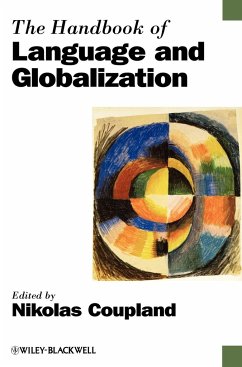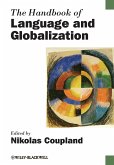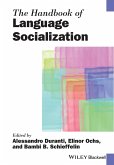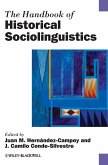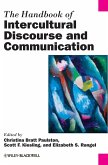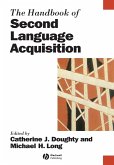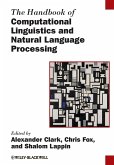The Handbook of Language and Globalization brings together important new studies of language and discourse in the global era, consolidating a vibrant new field of sociolinguistic research.
The first volume to assemble leading scholarship in this rapidly developing field
Features new contributions from 36 internationally-known scholars, bringing together key research in the field and establishing a benchmark for future research
Comprehensive coverage is divided into four sections: global multilingualism, world languages and language systems; global discourse in key domains and genres; language, values and markets under globalization; and language, distance and identities
Covers an impressive breadth of topics including tourism, language teaching, social networking, terrorism, and religion, among many others
Winner of the British Association for Applied Linguistics book prize 2011
Hinweis: Dieser Artikel kann nur an eine deutsche Lieferadresse ausgeliefert werden.
The first volume to assemble leading scholarship in this rapidly developing field
Features new contributions from 36 internationally-known scholars, bringing together key research in the field and establishing a benchmark for future research
Comprehensive coverage is divided into four sections: global multilingualism, world languages and language systems; global discourse in key domains and genres; language, values and markets under globalization; and language, distance and identities
Covers an impressive breadth of topics including tourism, language teaching, social networking, terrorism, and religion, among many others
Winner of the British Association for Applied Linguistics book prize 2011
Hinweis: Dieser Artikel kann nur an eine deutsche Lieferadresse ausgeliefert werden.
"An enlightening and engaging collection by eminent international scholars. A major resource for the study of theoretical and pragmatic approaches to Global English, including concerns about 'marginalization' and 'murder' of languages." -- Braj B.Kachru, Professor Emeritus, University of Illinois
"This Handbook provides a fascinating exposition of the complex, multidimensional nature of globalization as it pertains to the world's languages. Coupland has marshalled authors at the forefront of their fields who offer a diversity of approaches and do not flinch from disputes and challenging questions. I suspect that this book will transform the discourse on globalization within linguistics and will impel a reconsideration of whether linguistic diversity is inevitably impacted by global processes." -- Margaret Florey, Resource Network for Linguistic Diversity
"This Handbook provides a fascinating exposition of the complex, multidimensional nature of globalization as it pertains to the world's languages. Coupland has marshalled authors at the forefront of their fields who offer a diversity of approaches and do not flinch from disputes and challenging questions. I suspect that this book will transform the discourse on globalization within linguistics and will impel a reconsideration of whether linguistic diversity is inevitably impacted by global processes." -- Margaret Florey, Resource Network for Linguistic Diversity
"Overall, The Handbook of Language and Globalization succeeds in providing the reader with insightful analysis at the intersection of language and globalization. With its broad scope and inclusion of useful research topics, the volume can be considered as an open gate for a wider field of study and research in sociolinguistics. It also provides a stimulating and complex picture of the
state of theory and practice in the area of language and globalization." (Linguist, 18 October 2012)
"An enlightening and engaging collection by eminent international scholars. A major resource for the study of theoretical and pragmatic approaches to Global English, including concerns about 'marginalization' and 'murder' of languages." --Braj B.Kachru, Professor Emeritus, University of Illinois
"This Handbook provides a fascinating exposition of the complex, multidimensional nature of globalization as it pertains to the world's languages. Coupland has marshalled authors at the forefront of their fields who offer a diversity of approaches and do not flinch from disputes and challenging questions. I suspect that this book will transform the discourse on globalization within linguistics and will impel a reconsideration of whether linguistic diversity is inevitably impacted by global processes."
--Margaret Florey, Resource Network for Linguistic Diversity
state of theory and practice in the area of language and globalization." (Linguist, 18 October 2012)
"An enlightening and engaging collection by eminent international scholars. A major resource for the study of theoretical and pragmatic approaches to Global English, including concerns about 'marginalization' and 'murder' of languages." --Braj B.Kachru, Professor Emeritus, University of Illinois
"This Handbook provides a fascinating exposition of the complex, multidimensional nature of globalization as it pertains to the world's languages. Coupland has marshalled authors at the forefront of their fields who offer a diversity of approaches and do not flinch from disputes and challenging questions. I suspect that this book will transform the discourse on globalization within linguistics and will impel a reconsideration of whether linguistic diversity is inevitably impacted by global processes."
--Margaret Florey, Resource Network for Linguistic Diversity

